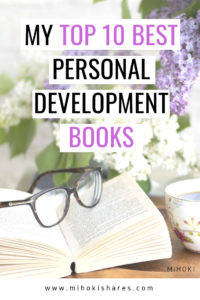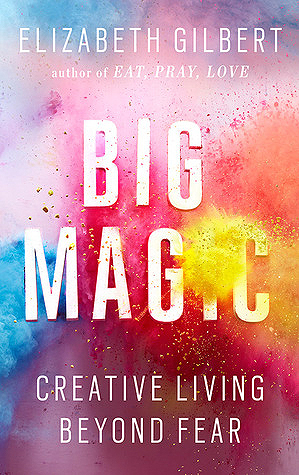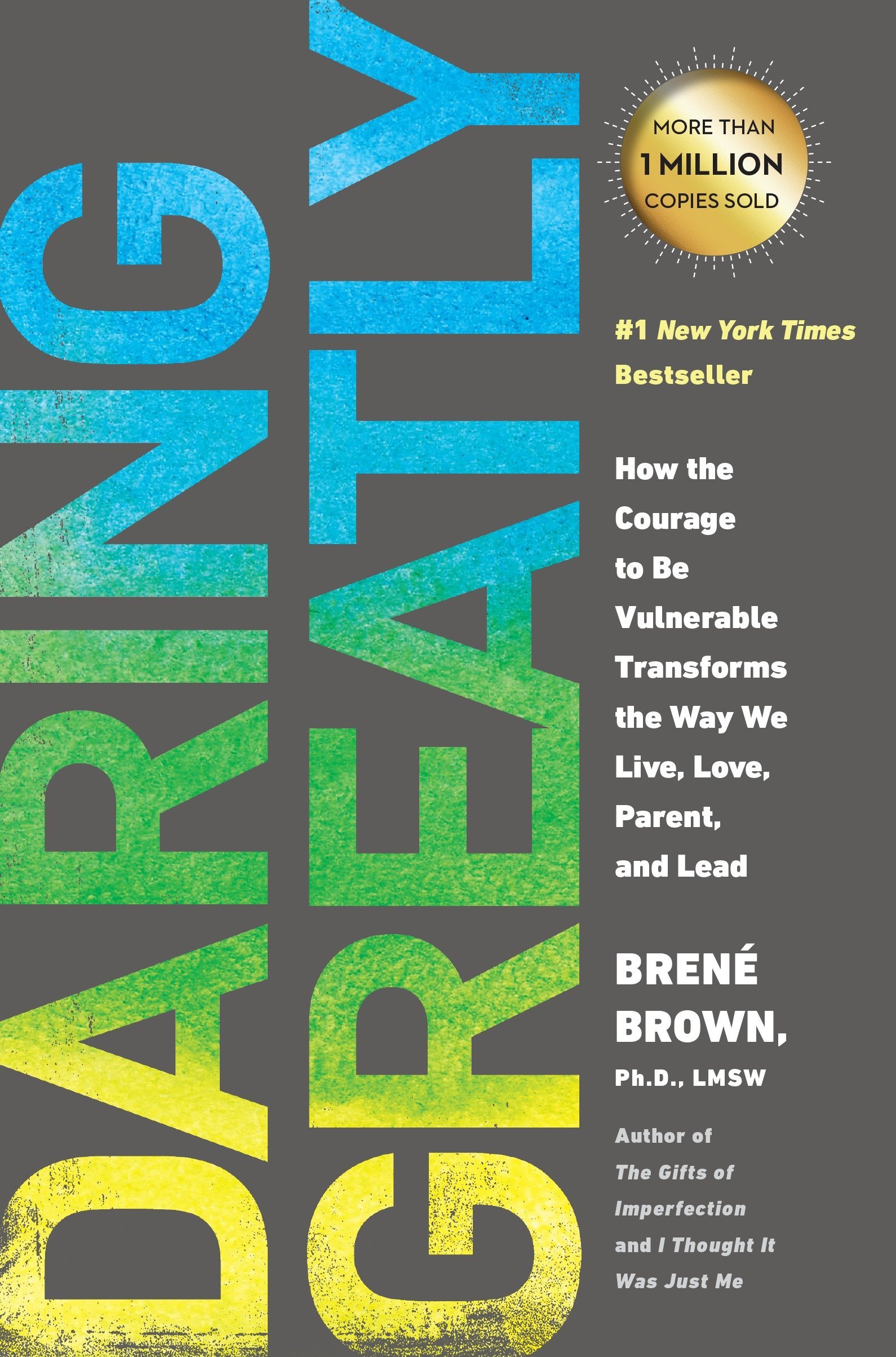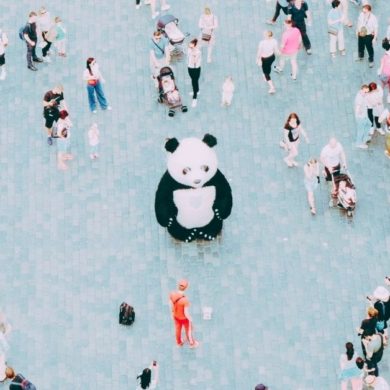As I’ve mentioned in my articles 13 tools I wish I’ve discovered earlier since I use sites like Blinkist which offers essential summaries of non-fiction and self-help books, I’ve read more and more. So with all the knowledge, I’ve learned while reading, here’s my list of books that really brought me a life-changing vision. Hope you enjoy it!

1. The Power of Now – Eckhart Tolle
I would be surprised if you haven’t heard of this book yet! This is the second self-improvement book I’ve read in my life, so it sure brought me a lot.
For the anecdote, the first time I started reading this book, I found it boring and incomprehensible, so I left it aside for at least 6 months. In the meantime, I got more interested in personal development.
So when I took it again, this book turned out to be a goldmine! If you start reading it but can’t stand it, don’t force yourself, it’s not the right time for you to read it, but don’t get rid of it either!
The Power of Now is the book to read if you’re looking for inner peace if you want to feel freer in life. You will find the teachings that will enable you to live the present moment and transcend your ego and mind.
The question-answer format makes you move forward calmly through this teaching because The Power of Now takes the form of a conversation between the author and his students.
The part that totally blew me away was the one about the ego: it is the cause of war, hate, and suffering. A world without any ego would be a different world of love. That’s our duty to work on our ego to spreading peace.
“To the ego, the present moment hardly exists. Only the past and future are considered important. It is always concerned with keeping the past alive, because without it – who are you?”
2. The 4h work week – Tim Feriss
Tim Ferriss offers a method in this book of how to cut work time to 4h a week while increasing your income. Maybe you don’t take it seriously, but that’s the real promise the author makes.
He explains that work is not a goal in itself, but a way to earn money. Reducing the time spent at work is essential: you will reclaim your freedom and act according to your wishes.
But how? Don’t forget about new technologies! You only know how to use them properly to not have to work all day and be able to live and be happy.
Applying this method takes a lot of time and you need to be REALLY determined. But with perseverance and consistency, I sincerely believe it is reachable.
But you will see when you read the book, that it requires sacrifice for some of us. So to help us make a decision, Tim Ferris puts three questions to ask ourselves:
1. Has being “realistic” or “responsible” ever blocked you realizing your dreams and constructing your dream life?
2. Are there not actions you “had to do” that did not bring you anything, but prevented you from realizing your dreams?
3. What am I sacrificing in maintaining my current lifestyle for the next 5 or 10 years?
“People will choose unhappiness over uncertainty.”
3. You Can Heal Your Life – Louise Hay
This book emphasizes the importance of positive thoughts: it’s not something naïve. On the contrary, it could bring you more well-being and happiness than you imagine.
We don’t know how powerful is our brain. Louise Hay, the author, is so convinced that she has devoted much of her career to healing through the mind. Introspection is the first step in a more serene life. She wants to prove that anyone has the power to change.
We hold in our hands the power to live the life we have always dreamt of. If you do not have a good opinion of yourself and are not fully satisfied with your life, I strongly recommend you to read it! Change is something long and difficult, but if you are willing to change, you are on the right track.
What it brought me: inspiration, daily positives affirmations, and exercises that I do as often as I can. I’ve learned that I’m fully responsible for what I live, my perception of myself and life is totally skewed. I’ve also understood the importance of forgiveness, introspection, and a clean mind. Finally, never underestimate the exercise of visualization!
“I do not fix problems. I fix my thinking. Then problems fix themselves.”
4. The Miracle of Water – Masaru Emoto
This book is short but fascinating. Here’s its description:
“Masaru Emoto has photographed thousands of water crystals throughout his years of research, yet few have been as beautiful and life affirming as those formed from the words “love and gratitude.”
In The Miracle of Water, Dr. Emoto demonstrates how water’s unique role in transporting the natural vibration of these words can help you welcome change and live a more positive and happy life. Dr. Emoto also explores the significance of words and language, their origins, and their impact on water.
He introduces and explains the key concept of resonance — the vehicle through which life-force energy is transmitted. From this knowledge, he draws out lessons that we can apply to our lives to reap the benefits of positive resonance, including more harmonious relationships, restored health, and improved communications.
When I talked about it with my surrounding, opinions were mixed: some thought that it was nonsense and impossible, and others totally agreed. For my part, I believe in this. Whether it’s the truth or not, it can only bring more love into the world.
For the curious, I’ve seen that some people reproduce the same test with rice. You cn check on YouTube their experiment like this one for example:
I’m planning to try it out too, I’ll keep you updated!
“If each one of us starts thinking, learning, and understanding more about water and the fact that we are water-based ourselves, then we can start to love, thank, and respect water in our daily lives.” – Masaru Emoto
5. The minimalist mindset – Danny Dover
When I first heard about minimalism, I thought it was when we lived in a tiny house, with the same clothes and few objects. But there is a misconception about it:
Minimalism is not about having the few objects as possible, but the minimum needed.
Moreover, minimalism is a mindset that you can apply in every aspect of your life (money, relationships, traveling…). It teaches us how to no longer suffer from the pressure of modern life. It gives our freedom and control back and redefines ways of thinking for greater efficiency.
This book suggests us to change our perception of things to enjoy a more authentic life. It explains how to acquire a minimalist state of mind, better manage our money and time, not to let ourselves feeling overwhelmed and how to improve our social relations.
In short, minimalism seeks to free us from material constraints so that we can make the most of our journeys and fulfill our potential. It leads to greater self-knowledge and better control of our environment.
“Minimalism is the constant art of editing your life.”
6. Miracle Morning – Hal Erold
This one can really be a life-changer, but needs a lot of willpower!
The keys ideas of this book are that it’s not impossible to live the life of your dream, but you have to set goals and be aware of the obstacles that prevent you from reaching them. You have to take a moment, every day, to prepare and create your path to success. And when is the best time to do it? Morning obviously!!
In this book there are tips about how to wake up full of energy, (with a big smile even at 5:30 am), how to fight procrastination, lack of responsibility and purpose, how to set up an efficient ritual that leads to success (depending on your personality and how to stick to it) and finally, how to adopt a new habit that will last. It also includes a program of 30 days.
“There is nothing to fear because you cannot fail—only learn, grow, and become better than you’ve ever been before.”
― Hal Elrod, The Miracle Morning: The Not-So-Obvious Secret Guaranteed to Transform Your Life: Before 8AM
7. The 7 Habits of Highly Effective People – Stephen Covey
The book is organized around four sections :
– Paradigms and Principles, where is it explained how humans detect their environment, how they set up their habits and how they program themselves in terms of habits
– Private Wis, where the author introduces the first three habits necessary to move a person from a state of dependency to a state of independence
– Public Victories, where three more habits are explained, to bring someone from the state of independence to a state of interdependence
– Renewal, finally, the last habit that invites the reader to begin a process of self-improvement
I really liked this warning I found on Goodreads.com so I’m going to share it with you:
“There are two main problems here, and we are talking only about the people who have read the book already. The first problem is that most people are too lazy to implement the ideals of Stephen Covey in their lives.
They consider his masterpiece of a book as a mere coffee-table book or a book that you use for light reading when you are traveling and then forget all about it. They do not realize that this book contains life-changing information. Or, they take the information and do not make the effort to actually use it so that it becomes known to them.
The second problem is that a lot of people have a myopic view of Covey’s ideals. These are people who are impressed by the book already. If you ask them what the seven habits are, they can rattle them off end to end, but then they miss the larger picture. They do not understand that Covey was trying to tell more than he wrote in words. There are hidden implications in this book, yes, and a lot of people have just failed to see through them.”
“But until a person can say deeply and honestly, “I am what I am today because of the choices I made yesterday,” that person cannot say, “I choose otherwise.”
― Stephen Covey, The 7 Habits of Highly Effective People
8. Big magic – Elizabeth Gilbert
Have you heard of Elizabeth Gilbert? She is the author of her best-seller “Eat, Pray, Love” which was a book I also enjoyed. But in this book, she teaches precious advice and helps us let our creativity flourish as well as bring our ideas to life. This book is not only for artists’ purposes, but it can also be applied in professional and personal life.
We learn important lessons such as that the value of work is not determined by its financial success, that the hazards of inspiration are part of the creative process and that daring is better than perfectionism.
I really like how she emphasizes that we do not need to be an exceptional artist to have a creative existence. We just have to learn how to overcome our fears and welcome ideas while having fun. It’s all about finding the balance between love and small sacrifices. So we must keep confidence in ourselves and our art and learn how to play with the circumstances.
“Done is better than good.”
― Elizabeth Gilbert, Big Magic: Creative Living Beyond Fear
9. Daring Greatly – Brené Brown
I’ve discovered Brené Brown after watching one of her TED Talks on YouTube. She broached a subject I didn’t really know the impact before. Vulnerability.
It’s what makes us authentic and totally open to the world around. It requires a lot of courage, but once we’re able to master it, we can fully enjoy every single moment of our lives.
If the vulnerability is still not clear enough for you as it was for me, Brené uses those examples among other to describe it:
– Sharing an unpopular opinion
– Asking for help
– Getting fire
– Starting a business
– Say “I love you” first
– Asking for forgiveness
etc. But to do it, we have to understand that we are worthy of being loved and enough the way we are.
To sum up the important points I liked, just stop trying to appear better and stay authentic and real. Be the person you want your children to be, stop with “do as I say, not as I do” thing. And especially, don’t tie your ego to the results, you don’t need the ego’s feedback.
“Courage starts with showing up and letting ourselves be seen.”
― Brené Brown, Daring Greatly: How the Courage to Be Vulnerable Transforms the Way We Live, Love, Parent, and Lead
10. The 80/20 principle – Richard Koch
“The Pareto Principle”, “Pareto’s Law”, “The 80/20 Rule”, “The 80/20 Principle”, “The Law of Least Effort”, “The Principle of Imbalance”, etc., all these appellations name the same reality, discovered by Vilfredo Pareto at the end of the 19th century.
What is it exactly?
This Italian economist has first noted that a minority of wealthy people own the majority of wealth. He observed, moreover, the existence of a constant mathematical relationship between the number of persons and the number of their incomes.
For example, according to him, if 20% of people hold 80% of the wealth, you can deduce that 10% hold 65% and 5% own 50%.
This principle can be applied to almost every field of life! Maybe sometimes you noticed that most of your efforts have not gone through the expected results, and it can be frustrating when you have spent so much time on it! But you’ll learn by reading that the Pareto is rather a state of mind than a simple principle.
The 80/20 principle goes beyond the search for efficiency. It is beneficial because it helps you recognize what really matters to you and gives meaning to your life. By performing non-essential tasks, you grant yourself access to a space of freedom, a time rediscovered. for happiness.
“The way to create something great is to create something simple.”
― Richard Koch, The 80/20 Principle: The Secret to Achieving More with Less
If this article was helpful to you, please feel free to check these books on Amazon with these link and you will contribute to keeping this website going at no additional costs to you ✿
Have you read any of this book? Which are the one you would recommend? What is your personal top 10? I’m looking forward to discover new books thanks to you!
Send you lots of love!

















